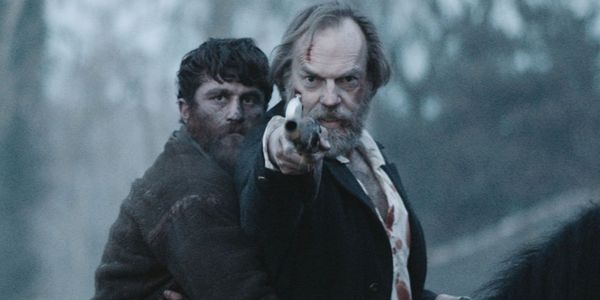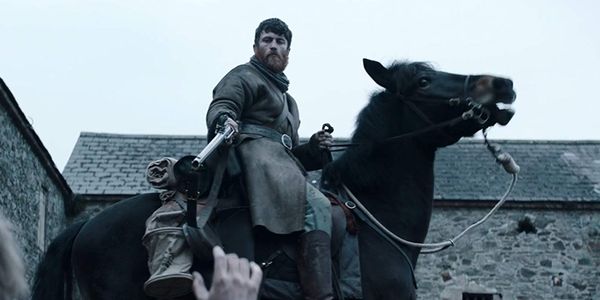BLACK ’47: Surprisingly Enjoyable Historical Epic

Tom is a recent graduate based in the UK, who…
With Britain’s long troubled history of colonialism, exploitation and injustice to nations all over the world, it’s surprising that there aren’t more films like Braveheart or The Patriot that calls this into question (and more surprising that apparently no one but Mel Gibson wants to make them).
Black ’47 is this kind of film, however. Very broadly, it’s the tale of Ireland as it suffered from a crippling famine and British mistreatment in the year 1847. Specifically, it tells the story of a soldier (James Frecheville) who returns to his homeland to find it in ruins, and embarks on a blood-filled journey of revenge. Assigned to bring him to justice is a fallen army hero and current police inspector (Hugo Weaving) who has a history with the soldier.

While the film seems on the surface (no thanks to the marketing) a grim and gritty slog, it’s actually a surprisingly gripping and enjoyable historical epic, which skillfully juggles action, character tension, and the sad history of the country.
The Historical Epic Becomes Irish
Historical epic films are, sadly, a rare genre now, with the likes of The Last Samurai and Master and Commander now 15 years old, so it’s refreshing to see Black ‘ 47 take up this genre. The historical context of the film, of Irish suffering and British cruelty, is balanced with the action and drama, and as such the film is both thrilling from moment to moment, and evocative over the course of its runtime.
The rural Irish setting of the film is beautifully depicted, with delicate set design and fantastic nature cinematography translating the country well to screen. The Irish characters only speak Irish to each other, which is a refreshing change from English-speaking inhabitants of non-English-speaking countries speaking English in films. On top of that the film clearly interacts with the history of the country, highlighting priests who only provided food to converted Irishmen and the social divide between Irish citizens and returning soldiers. All of these factors mean the film is as much about Ireland as its actual plot, and therefore the story is grounded in a rich tapestry of context.

The few action scenes are just as impressive as the world building. Most of the action is gunplay which, obviously, was a very different fare in 1847 than it is today. Muskets misfire, characters are stuck trying to reload for long periods of time, and when a shot does hit it creates a horrifying wound. This imbues the action with an underlying sense of dread that, coupled with the expertly crafted editing and shot composition, builds tension well.
The marketing material highlights comparisons of the film to Braveheart, and while this is a very accurate comparison (the story is about a man from a province wronged by the evil English, who takes vengeance into his own hands), the film it feels more like a Victorian-era rural The Bourne Identity (the story of a government trying to hunt down a rogue soldier).
Who Are These People?
The one shortcoming of the film is that not all characters seem fully realised, as though there are missing scenes that were cut from the final film. In fact, the only character that makes complete sense is the returning soldier, and mainly because his grief is shown through the filmmaking rather than his dialogue or acting. This undercuts some of the emotional tensions of the film somewhat.
Many of the characters are poorly defined in their opinions on Irish oppression and the events of the film. Captain Pope (Freddie Fox), the Inspector’s handler, seems moved by the events of the film – until he suddenly reverts to standard-evil-villain archetype near the end. Similarly the captain and inspector’s two companions, a young man and an Irish villager, are introduced and yet change their minds on matters with no warning – the former in finding sympathy for starving villagers, the latter in aiding the British. These changes feel unexpected, and a few lines of dialogue could have set these changes up better.

In addition Weaving’s Inspector Hannah doesn’t have clear motivation. It’s established why he’s hunting the soldier and that he has a past with him, but his briefly-mentioned military past and subsequent fall from grace seem to have little bearing on the story. There’s no sense of a higher driving force for the character than following orders. The character is seemingly defined solely by what he witnesses in the film, but we have scarce insight into his thoughts, so his decisions towards the end of the film seem a little abrupt.
It seems that the film can’t decide who the main character is – the Inspector, the soldier, or the country itself, and instead all three are given too much time to be part of an ensemble cast but too little to be considered the main character. At the very end of the film, the inspector is given a choice – follow the soldier’s advice to pursue a life of peace, or hunt down the captain to enact revenge. If the character was defined better there would be more emotional weight to the decision, but as it stands it simply works as an interesting way to end the film.
Conclusion: Black ’47
Black ’47 isn’t a perfect film – the shaky characterisation prevents the emotional undercurrents from truly picking up speed.
Regardless, it’s a fantastically captivating historical epic, which beautifully evokes its setting. The tense action scenes, impressive dialogue and delicate cinematography all add to its gripping story, while providing moment-to-moment excitement. It’s a shame that the film isn’t being circulated much, because it’s a captivating (though bleak) film.
Do you think the historical epic genre needs, or is due for, a resurgence?
Black ’47 was released in the US and UK on September 28, 2018
Does content like this matter to you?
Become a Member and support film journalism. Unlock access to all of Film Inquiry`s great articles. Join a community of like-minded readers who are passionate about cinema - get access to our private members Network, give back to independent filmmakers, and more.
Tom is a recent graduate based in the UK, who writes about films and games, and makes a few of his own. If he's not watching a film, playing a game or writing a script - don't worry! - he's probably just gone to make a cup of tea. He's never far from a screen.












